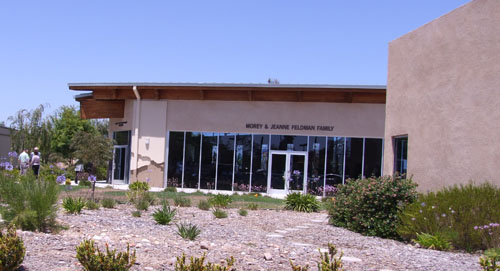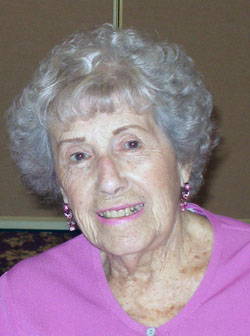
By Donald H. Harrison


POWAY, California –Jeanne Feldman, 96, was memorialized Thursday, June 14 in the Ner Tamid Synagogue sanctuary that bears her name and that of her husband, Morey.
Noting that the couple lived unassumingly while giving generously to philanthropies, Rabbi Nadav Caine said the Feldmans personified a Talmudic teaching that what people truly own is not their possessions which at best are only temporary, but rather the gifts with which they endow their community.
Born March 16, 1916, Jeanne Fogel Feldman met her husband of 57 years at a social gathering. According to her niece, Nancy Wolman, Morey approached Jeanne saying that there was a friend of his who wanted to dance with her. Jeanne, always one to know her mind, responded that she didn’t want to dance with the other fellow, she wanted to dance with Morey.
Although that typified the fact that Jeanne could be assertive, it was a departure from her generally shy personality. According to daughter Dena Feldman-Scarr, Jeanne tended to say little when meeting people for the first time, depending instead “on my dad’s gregarious and engaging personality to make friends.” Yet, once she became comfortable with someone, Jeanne had a powerhouse personality.
Dena recalled her mother as a woman who constantly clipped newspaper articles that she felt members of her family–particularly Dina’s husband Marshall and herself — might find useful. She loved to have the family gather for Jewish holidays, American holidays and family anniversaries and birthday, and never failed to urge her guests to “enjoy!” when serving meals.
One of Dena’s favorite memories was watching her younger brother Jeff, as a pre-schooler, sitting next to Jean and reading to her the children’s book, Go Dog Go. As her mother proudly listened to Jeff, she was urging him then–as she continued to urge her family throughout her life–to use their God-given potential.
Another niece, Elaine Fogel Schneider, author of Massaging Your Baby: The Joy of Touch Time, recalled that Jeanne insisted that she use both her maiden and married names when publishing the book. It was wonderful advice, because there are numerous Elaine Schneiders to be found on the Internet, but not so many Elaine Fogel Schneiders.
Jeanne’s grandson, Shane Feldman-Scarr, who spoke as his sister, Anna, stood beside him, recalled that when he would make a mistake, Jeanne would query him, “What were you thinking!” But no matter what he did, he knew that she would always be there for him.
Morey Feldman also spoke briefly about his wife, telling friends from throughout the San Diego Jewish community, that when he and Jeanne moved to San Diego 37 years ago, it was another blessing in a life time of blessings, including those of “being a family, being of service to my country and being together.”
“God bless you all,” he added.
Jeanne had suffered a fall that hospitalized her, and she did not recover from complications that set in. Although her family thought she would rally, Jeanne knew better and with clear mind to the end, made it a point to settle her affairs. She died Tuesday, June 12.
After the traditional chanting of the memorial prayer El Moleh Rachamim, Rabbi Caine had the family gather on the bima around the gurney on which Jeanne’s casket had been placed. They recited kaddish together, then escorted the casket to a hearse while the congregation remained behind, softly singing “Oseh Shalom.”
The Conservative rabbi asked the congregants not to follow the family out of the sanctuary but to allow them some private time before they would return to a small reception on the patio , which he said was Jeanne’s favorite place in the synagogue. Following the synagogue service, Jeanne Feldman was buried at the Miramar National Cemetery, her husband having been a U.S. serviceman.
*
Harrison is editor of San Diego Jewish World. He may be contacted at donald.harrison@sdjewishworld.com
Rabbi Nadav Caine of Ner Tamid Synagogue delivered the following eulogy for Jeanne Feldman:
The spiritually sensitive know that there are no coincidences: when we are in touch with the universe, with “synchronicities” as Carl Jung used to call them, we notice the deep connections going on in our lives. Some look for their connections in the horoscopes of the stars, but I look for them in Torah. The imagery of the evening prayer for the sunset (which we say after the Barkhu) suggests that the sky is a Torah scroll stretched out along the heavens and rolling along in its annual cycle. Where that Torah scroll is open to in the moment we are born, or get married, or die, is no accident.
This week we lost Jeanne Feldman, may her memory always bring blessing to this world. Her soul passed into the next world while the Torah above was open to parashat Sh’lach L’kha, in the Book of Numbers, recounting what happened when the first generation of Israelites who left Egypt arrived at the Promised Land. They sent in twelve scouts. Ten returned inciting fear among the people with news that the Land was hostile to Israelites, that much would be lost entering it, and it would be better to return to Egypt. “We must have looked like grasshoppers to the giants who live there!” they add. Two scouts (Joshua and Calev) return with a far different report: it is an exceedingly good land, one that flows with milk and honey, and there is no reason to fear.
I’d like to tell you the story of someone who became one of those scouts.
Jeanne Fogel was born into a working class Jewish family in New York. Her father, a house painter, died at a very young age due to the lead fumes from the paints that were standard at the time. He died as his daughter Jeanne graduated as valedictorian from her high school. She immediately went to work, becoming the breadwinner, supporting a family of six, living in a tiny two room apartment. She began working at a laundrette, but her keen intelligence and competence got her noticed, and soon she was working in the office. At nights she studied Spanish and shorthand and with her keen prescience of “what comes next” (as she has always been famous for), she was soon hired by an import-export firm needing someone who could handle the paperwork with South American companies, as well as her shorthand (what we today call “computers”). As her boss traveled, she ran the office. From there she was snatched up by a larger and more renowned import-export business. During World War 2, she worked in the Brooklyn Navy Yard tracking and directing the trains carrying food supplies for deliveries. In 1954, she met her beshert, Morey Feldman, at a social. As Morey asked Jeanne to dance with his friend, Jeanne replied, “Why don’t you speak for yourself?” He did. (It was hard to say “No” to Jeanne.) They courted, married in a tiny ceremony, and began a marriage that was truly a “partnership” years ahead of its time.
Morey sold his dry cleaning business, they packed up the car, and set out for California with thoughts only of the future. After six weeks, they arrived in Los Angeles, and while Jeanne was offered work quickly, Morey and Jeanne were prescient in predicting that L.A.’s smog problems would only worsen, and they chose to move on. Following a tip from the motel manager to try San Diego, they drove down the West Coast. In those days, the beaches were pristine and empty. Like the two Israelite spies crossing the beautiful and empty wilderness, they camped on the beaches, with Morey cooking on his camping stove, and picnicking beside the gorgeous horizon. Morey says we can’t even imagine the beauty of that journey. They eventually arrived in La Jolla, only to find it restricted to Jews.
What would you have done at this moment? No family nearby, no friends, thousands of miles from home, no job, and suddenly “Jews not welcome.” I would have turned back. Like the Israelites of the Torah, I would have activated my Jewish “complaining” gene, knew that I had a wonderful tale to tell the folks back home of how two people who had served their country found the promised land “restricted” to Jews, and started the journey back to what was familiar. Not Morey and Jeanne. Morey says it never occurred to them. Two of the most patriotic people I have ever met, Morey and Jeanne have spent much of their lives talking openly and often of their gratitude to this country, as a place of warm welcome and fantastic opportunity, of an exceedingly good land, with nothing to fear.
Morey shifted to the furniture business, starting at the lowest rung for a firm in Coronado. In six months he was managing their store in Imperial Beach, and soon thereafter he was managing their main store. So he and Jeanne started their own business out of their tiny home, with Jeanne as the owner. In a time when there were virtually no woman-owned businesses of that kind, Jeanne was a feminist before feminism, with Morey as her partner, not her better. As Dina and Jeff were born, they took a risk and experimented with furnishings rental, and working six (or seven) days a week, their first-of-its-kind rental business flourished, though they lived in the same modest means. For Jeanne, she needed nothing fancier, as long as she could support her many causes: Hadassah, Bnei Brith, JCC, the Hebrew Home, the Old Globe, the symphony, Emily’s List, Planned Parenthood, Hebrew Free Loan, and synagogues including Ner Tamid [which wouldn’t be here today without them]. Despite being entirely self-made, Jeane and Morey believed that it was the opportunities of this great Land that deserved the credit. They dedicated what they have had to building institutions that give others the opportunity, Jeanne would say. It’s up to each person to do something with it.
On Friday nights, we begin the service with Psalm 95 (“Lkhu Neranena,” the gratitude psalm), in which God explains that it was the Israelites’ own penchant for complaining that kept them out of the Holy Land for an entire generation. The Psalm explains that God had given us the opportunity of entering the Promised Land, and we had kept ourselves out by giving in to complaining and a lack of gratitude. We all inherit that Jewish impulse. But more than any person I’ve ever met, Jeanne Feldman never gave in. She, like Morey, expressed not a moment of self-pity. Which of the twelve scouts would you be? Jeanne, along with Morey, were builders of our Land, for they saw its goodness and opportunity, and saw no contradiction in hard work and gratitude. May Jeanne always be remembered for a blessing.